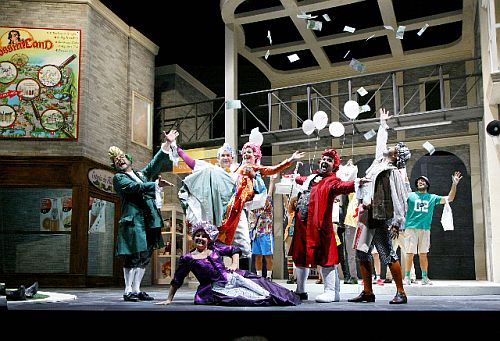 Italy Rossini, Il Signor Bruschino, Orchestra Sinfonica G Rossini. Teatro Rossini, Pesaro. 15.08.2012 (JB)
Italy Rossini, Il Signor Bruschino, Orchestra Sinfonica G Rossini. Teatro Rossini, Pesaro. 15.08.2012 (JB)
Cast:
Guadenzio, Carlo Lepore
Sofia, Maria Aleida
Bruschino, father, Roberto de Candia
Bruschino, son / Policeman, Francisco Brito
Florville, David Alegret
Filiberto, Andrea Vincenzo Bonsignore
Marianna, Chiara Amarù
Production:
Conductor, Daniele Rustioni
Production by Teatro Sotterraneo
Sets and Costumes by Accademia di Belle Arti, Urbino
Lighting, Roberto Cafaggini

Photo Credit: Studio Amati Bacciardi
Il Signor Brushino, Rossini’s one act farce, normally plays in just under ninety minutes. Under the youthful baton of Daniele Rustioni it feels like double that. The problem is that Maestro Rustioni has only one tempo throughout –Allegro ma non troppo– with serious commitment to the non troppo. Farce cannot work with the brakes applied so forcibly. I suspect that Rustioni wanted to give the singers time to enunciate the words. And that is indeed a worthy objective for Giuseppe Foppa’s text is a libretto of noteworthy elegance. And besides, Maria Aleida’s intonation (she was Sofia) can go off the rails when things move fast, as they certainly do in her showcase aria –Ah donate il caro sposo- So Rustioni is also a considerate conductor. All the same, I’m pretty sure that he would have had his knuckles rapped by Gioacchino Rossini who can no longer speak for himself. So please forgive me for so presumptuously speaking on his behalf.
They say you should cut your cloth according to the materials you are working with. That lesson has not been lost on M.o Rustioni. But on the other side it has to be said that compromise has no real place in Rossini. None of these singers was vocally distinguished. (I was hearing Bruschino with the thrilling vocal excellence of Matilde di Shabran still ringing in my ears.) Rustioni should have known that in this situation he had two alternatives.
(1) to change the cast (which I would bet my bottom dollar was outside his possibility) or
(2) insist that the singers accommodate livelier tempi, and not the other way round (his accommodating them) which might have either (a) forced a change of cast or (b) caused the singers to meet the challenge and thereby shown them they had qualities which they didn’t know and thus putting them permanently in Mo. Rustioni’s debt.
I admit that the improbability stakes of (2) (b) are high.
The little lad made a smart start with the overture, which you will remember is made up of mostly short phrases answering one another where they are not mocking one another. Understatement is the order of the day here and Rustioni has a good line in understatement. Rossini was twenty-one at the time of the premiere. That’s probably about the same age as Daniele Rustioni is now, but the boy, though small, is strikingly handsome, looks much younger and was perfectly groomed. But he has not yet developed the art of sending himself up, which as you hear clearly as the score proceeds, is much in evidence in the music. His clear, near-perfect stick technique is not enough.
Sparkle was what was missing. Truth to tell, the evening frequently sank into stodge –the death blow to any attempt at farce.
The Teatro Sotterraneo, a vital Florence-based group were making their debut at the ROF and their production did indeed sparkle with dry wit, with sets and costumes from the nearby Accademia di Belle Arti of Urbino. Perfectly timed appearances of local boys and girls who are no doubt amateurs but who have learned to perfection comedy’s all-essential art of timing. If all this wit had not been engulfed in the musical troughs of stodge, it would have been a sparkling show indeed.
The cast are listed above and on that score, it pains me to say that, like them, I have nothing to report beyond their names.
Jack Buckley